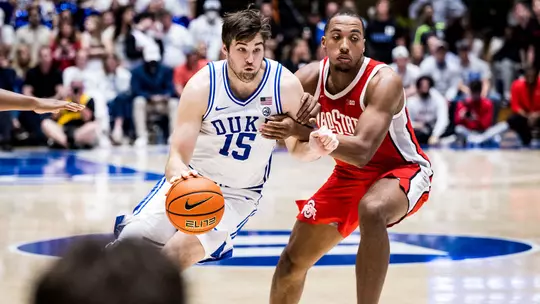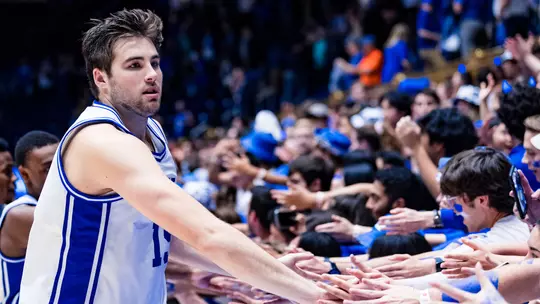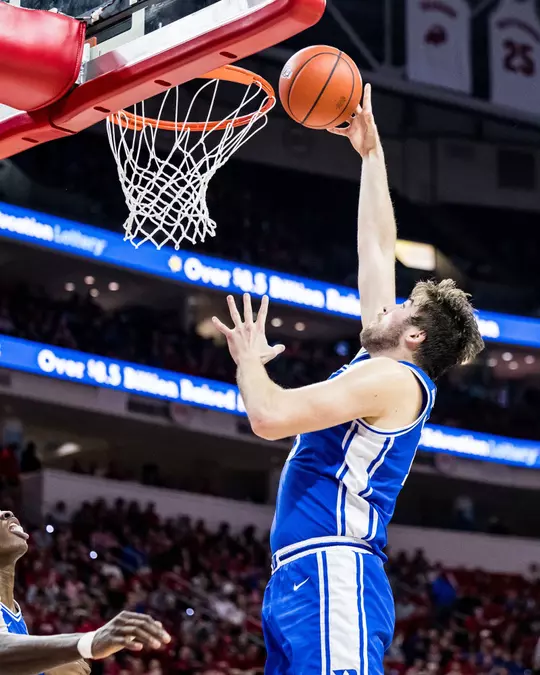
David Shumate Sits Down with Ryan Young
Duke Center Reflects on his Experience, Mentorship and the Brotherhood
David Shumate, GoDuke The Magazine
These interviews originally appeared in the 14.6 Issue of GoDuke The Magazine – January 2023
David Shumate: We talked over the summer about your decision to come to Duke, how the Fuqua School of Business played into it and everything on down the line. Expectations versus reality, halfway through the season now — how has it stacked up?
Ryan Young: Yeah, I think it’s been awesome. It’s exceeded most expectations of mine. I really wanted to come here and have an impact on the court and help this team win and I’ve been able to find a little bit of success in that and carved out a role and helped these young guys get better, but also contribute to winning overall.
You mentioned the school side of it — it’s been really exciting to get the opportunity to pursue a degree, for my masters in the Fuqua School of Business, which has been awesome as well. The balance has been everything I’ve imagined and more. It’s exciting. We just need to keep the wins coming.
DS: I want to talk about family and school coming up in a little bit, but first on the basketball side of things, it’s a two-way street, right? There was a lot you could bring to Duke, but how has your game changed since you’ve been here?
RY: Yeah, absolutely. I think a lot of the things that I like to pride myself on — being a player that does a lot of the gritty work, rebounding and getting after loose balls, playing tough in the paint — but I think that one thing’s changed. Just being in a different conference and being able to adapt to new playing styles. It’s definitely a little different system that I’m in here and it forces me to play a little bit more on the perimeter and make better passes, and then also play defense a little bit more, play with a little bit more versatility. There’s a lot of different style bigs in the ACC compared to the Big 10, which is much more just bigger, I guess I’ll say slower guys and a lot of different types of play.
So, I think it’s just game-to-game there’s much more diversity and change in the way that teams play and the bigs that I play against in this conference than the previous one. So, I think that’s been the biggest challenge for me.
DS: The answer to this question might be no and that’s fine. But, obviously, you played for another coach that came through Mike Krzyzewski’s system in Chris Collins. Did it ease the learning curve coming here? Are there similarities in terms of the sets and everything like that?
RY: I think so, yeah. I don’t know specifically about offensive sets, but the way the program is run, you definitely see a few similarities and that’s something I definitely can appreciate and it’s made the transition easier. It’s been awesome. I came in here wanting to bring a certain amount of leadership and experience and it’s been great. It feels like it would’ve been easier to come here than maybe from a different type of system elsewhere and try to be that same sort of leader in the locker room and be a mentor for the younger guys. So that’s been awesome to have that kind of background and have the transition be easier because of that.

DS: You mentioned being a mentor for the younger guys. Obviously here at Duke, the one-and-dones are a feature of the program. How cool has it been, how interesting has it been for you to watch those guys grow up over the last four or five months?
RY: It’s been awesome. It’s been funny to try and put myself in their shoes and look back because I didn’t have their talent at that age, but it’s a process. No matter how good of a freshman you are and, how talented and what your aspirations are, there’s always going to be a learning curve. There’s such a huge difference between high school basketball and college and every freshman hits, you know, a wall here and there. It’s been awesome to try and help be that guy that is in their ear and continually encouraging them and playing against them.
I take a lot of pride in that because I redshirted my freshman year, and I was extremely thankful looking back on it for the two guys ahead of me — a starting senior center and a junior center. When I came in I was undersized. I wasn’t ready to play. So I redshirted as a freshman and got so much better that year, just learning from those guys and competing against them. Most days I was losing a lot against them and there were some tough lessons, but I look back on it and I wouldn’t have wanted it any other way. There’s a sense of almost paying it forward for those guys that helped me when I was a younger player. I see myself and these guys and you know, just want to be kind of passing that along and sharing everything that I’ve learned with them.
DS: Obviously, the Brotherhood is a big part of the story here at Duke. You guys are part of that, and I feel like when I watch teams… Look, it’s not friendly when you go on the road. It’s deafening when you’re playing Cameron, there’s a lot of media attention, a lot of pressure and sometimes it can cause you to grow apart. But more often than not here at Duke, it seems like it causes you guys to grow closer. Is that fair? It seems like it makes you guys come together because it’s a very unique experience to play with Duke across your chest?
RY: Yeah, I think absolutely. I mean, I’ll be honest, I didn’t really know. Being on the outside, I kind of thought the Brotherhood was just a thing they said here. I didn’t grow up a huge Duke fan. I just thought it was a slogan, like every team has a slogan. I got here and immediately understood that it’s the real deal. I remember being here for Coach K Academy and seeing that it’s quite an experience, but you really see like just tons of former players and coaches here.
Then we had Jayson Tatum around in the preseason. We had a ton of NBA guys, Cam Reddish, RJ Barrett, and I was quickly corrected in thinking that that was just a thing. It’s a real deal here and it’s been really cool, more so for the young guys to see those kind of guys come back and play here. It’s been awesome.
Then what you said, the kind of momentum that you get from playing in this program, in this gym is a big deal. I remember I was more so on the other side of things playing in the Big 10. We were a smaller school at Northwestern and we didn’t have the kind of following that some of those bigger schools, the Michigan States and Indianas, and you go and play there and you felt it. It’s being on the other side of things like an 8-0 run in Assembly Hall is hard to play against. Now playing here in Cameron when we’re on a run you feel it, and it’s a big deal. It’s just awesome to have this kind of program behind you, the history and the fans and the way the community rallies behind the team. It’s special and it makes a difference.
DS: It can make your voice a little raspy the day after the game – I think both of us can vouch for that (laughing)…
RY: It’s hard to… I will say that it’s a little bit harder to communicate, but the momentum makes up for it having to try and scream over those 9,000 fans.
DS: I wrote some of this down, your mom played volleyball at Syracuse and your dad was on the crew team there. Your sister Jordan played volleyball at George Washington, your brother Kyle played basketball at Siena and later on at Flagler. So, an obvious question — everybody’s playing athletics, who’s the most competitive in the family?
RY: It’s a good question. I think my mom is pretty competitive. I would say she’s the most competitive. My brother is the sore loser of the family. But it was fun growing up and it’s funny now when we do get together. We obviously don’t get together as often now that everybody’s older and we’re at three different schools, but my sister’s the shortest of the family and she’s 6-foot. So it’s a scene when we go out to a restaurant or whatever. There’s a lot of people staring. We’re a tall family and athletic and it’s been nice to bounce ideas off of each other knowing we’ve had similar experiences.
I look to my sister, brother and parents obviously for a lot of advice here and there since we’ve all had our time being a student-athlete. It’s awesome to have a support group that really understands what you’re going through and can offer advice and mentorship.
DS: I wrote some of this down, your mom played volleyball at Syracuse and your dad was on the crew team there. Your sister Jordan played volleyball at George Washington, your brother Kyle played basketball at Siena and later on at Flagler. So, an obvious question — everybody’s playing athletics, who’s the most competitive in the family?
RY: It’s a good question. I think my mom is pretty competitive. I would say she’s the most competitive. My brother is the sore loser of the family. But it was fun growing up and it’s funny now when we do get together. We obviously don’t get together as often now that everybody’s older and we’re at three different schools, but my sister’s the shortest of the family and she’s 6-foot. So it’s a scene when we go out to a restaurant or whatever. There’s a lot of people staring. We’re a tall family and athletic and it’s been nice to bounce ideas off of each other knowing we’ve had similar experiences.
I look to my sister, brother and parents obviously for a lot of advice here and there since we’ve all had our time being a student-athlete. It’s awesome to have a support group that really understands what you’re going through and can offer advice and mentorship.

DS: You guys have been talking about building, growing as a team, the younger guys growing up. We’ve talked about that a little bit. Now you’re kind of at the business end of this thing. You’re about to turn the corner in league play and head into the second half of it. What’s important down the stretch as you start to get towards championship season so to speak?
RY: I think there’s two things that come to mind right away. One, it’s being able to prove that we can play on the road and be the same team outside of Cameron. That’s something that just comes naturally. I mentioned how big of a deal it is to have that momentum, those fans behind you. I feel confident as anybody when we’re playing in Cameron, but we’ve got to be able to keep that same energy and that momentum when we’re playing on the road in somebody else’s gym. We’ve got to prove that we can do that anywhere and obviously that’s going be big at neutral site locations down at the end of the year, especially in Greensboro and hopefully beyond that.
Then the other thing is just proving that we can play consistently. While there’s a number of reasons we haven’t at times, that’s something that we need to work toward as we get more experience playing together.
But I think it’s a balance of those two things — test ourselves to be able to prove that we can win on the road and be that same team, and then just keep on working towards more consistency as we get deeper into league play.
Dedicated to sharing the stories of Duke student-athletes, present and past, GoDuke The Magazine is published for Duke Athletics by LEARFIELD with editorial offices at 3100 Tower Blvd., Suite 404, Durham, NC 27707. To subscribe, join the Iron Dukes or call 336-831-0767.
